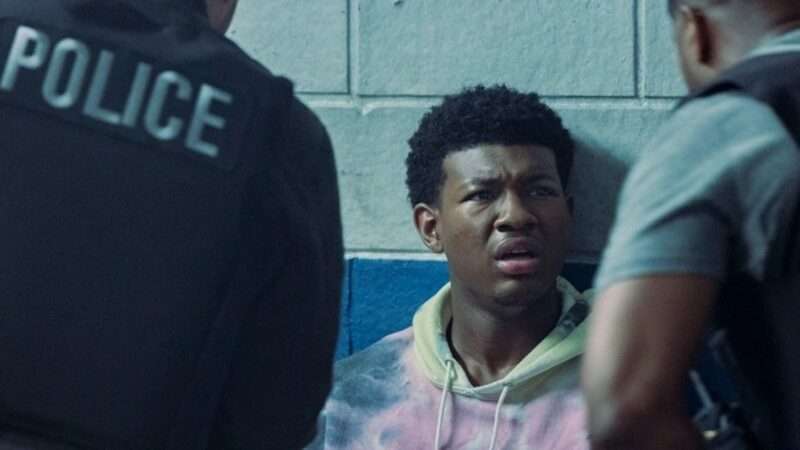
61st Street. Available now on AMC+.
Police barbarically rampaging through the inner city is no longer a very original television trope, either in entertainment programming or, sadly, news. So when AMC’s drama 61st Street opens with scenes of slit-eyed cops preparing a raid on an open-air corner drug market, there’s a certain been-there-done-that ambiance in the air. It lasts only moments. Explosive and appalling, 61st Street tears off its mundane outer wrappings to reveal foundation garments of pure steel.
Created and written by Peter Moffat, veteran chronicler of a criminal justice system that’s gone off the rails (Showtime’s Your Honor, HBO’s The Night Of), 61st Street makes up in brilliant workmanship what it lacks in originality. Whether predatory cops, broken-down old lawyers, or wary kids just trying to make their way in a hostile ‘hood, his characters shine with a chilling clarity.
61st Street is essentially a collision of four of those characters during a narcotics raid on Chicago’s blighted South Side. Moses Johnson (British TV regular Tosin Cole) is a high school track star with a bright future. (“You’re gonna be somebody,” his hardnosed coach assures him.) His soon-to-be-nemesis Lt. Brannigan (Holt McCallany, Blue Bloods) is a ruthless cop whose glib analysis of police misconduct is that “we lost control of the story.” Physically broken and emotionally spent public defender Franklin Roberts (Courtney B. Vance, who played Johnnie Cochran in American Crime Story‘s retelling of the O.J. Simpson trial) is trying to summon the will to handle one more case. And Johnny Logan (Mark O’Brien, City on a Hill) is a police officer consumed with rage at the murder of his partner but bewildered by his unspoken knowledge of a cop secret.
The raid goes bad in its opening moments and quickly gets worse. Johnson, an innocent bystander, tries to escape trouble by running, which the cops of course interpret as guilt. When Logan’s partner is killed (inadvertently, though he doesn’t know that) while in pursuit, he goes on a violent quest for vengeance. But when trying to resuscitate the man, Logan discovers his buddy was wearing a concealed microphone and tape recorder—but for what?
Meanwhile, the vulpine Lt. Brannigan sees the death as a chance for a police propaganda coup, especially if Logan will claim to have seen more than he really did. “If we play this right,” Brannigan says, Logan’s partner “won’t have died for nothing”—a cynically accurate assessment of the real value of the drug war.”
Public defender Roberts finds himself drawn into the case, even though he’s ravaged with a debilitating and potentially fatal disease and wasn’t all that potent even when he was healthy. In his last case, Roberts couldn’t even get a reduced sentence for a client accused of stealing infant formula for a hungry baby. He’s represented 7,000 people in a career spanning 30 years, Roberts notes to his wife, then bluntly adds: “What good has it done?”
61st Street’s action sequences are not, by the standards of the genre, especially grisly. But they’re shot with a heart-pounding, riveting intensity that compels attention. In quieter moments, it achieves—if that’s the right word—a desolate sense of hopelessness as the cops and courts chew up the guilty and the innocent alike. And it manages to summon up a truly ferocious rage about the drug war, a useless demonstration of stagecraft on behalf of politicians and their uniformed goons. (There’s a temptation to say that the show is a bit heavy-handed in its portrayal of cops, whose default option in interrogation is torture—that is unless you know that the city of Chicago is paying out $67 million a year to settle police misconduct claims.)
In one scene, Brannigan and his men are bullying Johnson’s aging mother for the information she doesn’t have when the kid calls her. Tell him to come in and he’ll be treated fairly, the cops whisper. She nods, takes the phone, and then screams: “Run!” If only we could.
The post <em>61st Street</em> Dramatizes Chicago's Brutal, Hostile Criminal Justice System appeared first on Reason.com.
from Latest https://ift.tt/2fxrCIM
via IFTTT